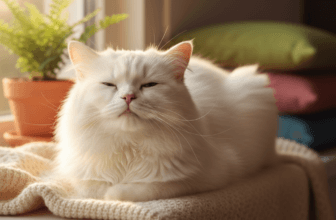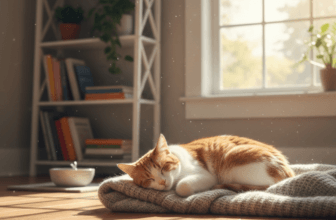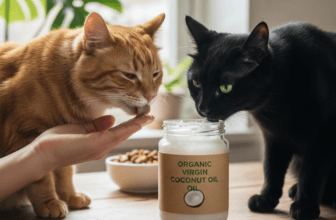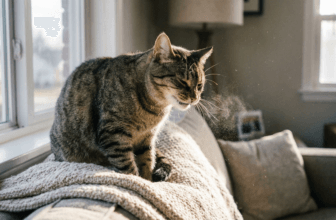
Table of Contents
Did you know nearly 61% of cats in the United States are overweight or obese? This is a big problem. Keeping your cat at a healthy weight is key. Most cats should weigh between 8 to 12 pounds.
Factors like age, breed, gender, and health play a role in this. Knowing these weights is important for your cat’s health. This article will help you understand cat weight charts better.
How Much Should a Cat Weigh?
The average weight for domestic cats is between 8 to 12 pounds. This can change due to age, breed, gender, and health. Knowing these factors is key to keeping your cat at a healthy weight.
Every cat is different, and what’s healthy for one might not be for another. Larger breeds like Maine Coons can be heavier, while smaller breeds like Singapura might be lighter. Checking these details helps you see if your cat is at a good weight.
Regular vet visits are important for your cat’s weight and health. By keeping an eye on their weight, you help them stay healthy and live longer.
Average Cat Weight Chart by Age
Knowing the average cat weight by age is key to your cat’s health. The cat age weight chart below shows expected weights at different life stages. It helps you see if your cat is at a healthy weight as they grow.
Weight Ranges at Different Life Stages
| Age | Weight (pounds) |
|---|---|
| 0.5 years | 5 |
| 1 year | 8 |
| 2 years | 9 |
| 3 to 16 years | 10 to 12 |
Factors Affecting Weight by Age
Many things can change a cat’s weight as they age. These include:
- Activity level: Active cats usually weigh less than lazy ones.
- Diet: What your cat eats greatly affects their weight.
- Genetics: Some breeds naturally weigh more or less.
Average Cat Weight Chart by Breed
Knowing the average cat weight by breed is key to keeping your cat healthy. Each breed has its own size and weight. For example, Siamese cats usually weigh 5 to 10 pounds. On the other hand, Maine Coons can weigh between 10 to 25 pounds.
Understanding these breed-specific weights helps you watch your cat’s health closely.
Comparative Weight Ranges for Popular Breeds
| Cat Breed | Average Weight (lbs) |
|---|---|
| Siamese | 5 – 10 |
| Maine Coon | 10 – 25 |
| Persian | 7 – 12 |
| Bengal | 8 – 15 |
| British Shorthair | 9 – 18 |
Breed-Specific Weight Considerations
Remember, averages are just a starting point. Cats can vary due to age, health, and diet. Knowing the average weight for your cat’s breed helps with monitoring.
By doing this, you can spot any health issues early. Then, you can talk to your vet for advice. Learning about these weight ranges helps keep your cat healthy and happy.
Average Weight of a Male Cat vs Female Cat
Knowing the weight differences between male and female cats is key for pet owners. Male cat weight usually is higher than female cats. This is due to genetics and physical traits. Male cats can weigh between 10 to 15 pounds, while females are typically 8 to 12 pounds.
This shows that a cat’s gender is important when thinking about adopting one. It affects their expected weight.
Breed also plays a big role in these weight differences. For example, a male Maine Coon can weigh up to 25 pounds. A female Maine Coon weighs between 10 to 15 pounds. These differences are seen in many breeds found in homes.
For female cat weight, reproductive status matters too. Spayed females might struggle with weight management. It’s important for owners to watch their cat’s diet and exercise to keep them healthy.
How Health Issues Impact Cat Weight
Managing your cat’s weight is key. It’s about knowing how health problems can affect their size. Changes in weight can mean there’s a health issue that needs attention.
Significant weight gain or loss can upset your cat. It’s a sign they might need to see a vet.
Health Conditions Leading to Weight Gain
Several health issues can cause cats to gain too much weight. Here are some examples:
- Hypothyroidism: This condition slows down metabolism, causing weight increases.
- Arthritis: Cats with joint issues often reduce their activity, leading to weight gain.
- Diabetes: Insulin resistance can result in increased appetite and weight gain.
- Cushing’s Disease: Hormonal imbalances may lead to excess fat accumulation.
Health Conditions Leading to Weight Loss
On the other hand, some health issues can cause cats to lose weight. Here are some common ones:
- Hyperthyroidism: This condition increases metabolism, often resulting in significant weight loss.
- Kidney Disease: Affected cats frequently lose weight due to decreased appetite and increased thirst.
- Dental Issues: Painful teeth or gums can make eating difficult, leading to weight loss.
- Cancers: Various forms of cancer can affect appetite and metabolism, causing weight decline.
It’s important to understand these health issues and how they affect a cat’s weight. Watching for changes in your cat’s behavior, eating habits, or physical condition is vital. This helps catch health problems early and keeps your cat at a healthy weight.
The Importance of Weight Management for Cats
Weight management is key to your cat’s health and happiness. Keeping your cat at a healthy weight is vital. It helps avoid many health problems linked to being overweight.
Excess weight can cause serious issues like diabetes, arthritis, and heart disease. These conditions can greatly reduce your pet’s quality of life.
It’s important to understand that these health issues can shorten a cat’s life. A balanced diet, regular exercise, and vet visits are vital for weight management. By focusing on your cat’s weight, you help them live a longer, happier life.

How to Tell if Your Cat Is Overweight or Underweight
Knowing your cat’s weight is key to their health. A good way to check is by using the body condition score (BCS). This score helps see if your cat is too heavy or too light. The BCS system uses a scale from 1 to 9.
Utilizing Body Condition Score Charts
The body condition scoring for cats is easy to use. Vets often use a 1 to 9 scale. Here’s what it means:
- 1 to 3: Shows your cat is underweight.
- 4: Means your cat is at the perfect weight.
- 5 to 9: Means your cat is overweight to obese.
Checking and tracking your cat’s BCS often is helpful. It helps you know if they need diet or lifestyle changes. Knowing their BCS score helps keep them healthy and avoid weight-related problems.
Weight Loss Tips for Fat Cats
If your cat is overweight, there are many ways to help them lose weight. Start with a special diet that helps with weight loss but also keeps your cat healthy. This diet should give your cat all the nutrients they need.
Watch how much food you give your cat and cut back on treats. Choose healthier treats that won’t mess up their diet. Playing with your cat regularly can also help them get more exercise.
Having a set time for meals can help with weight management. Instead of leaving food out all day, feed your cat at specific times. Losing weight slowly is better for your cat’s health.

Weight Gain Tips for Thin Cats
Many cat owners face the challenge of underweight cats. This can lead to serious health problems if not handled properly. It’s important to know how to help your cat gain weight. Focus on giving them foods that are full of calories and nutrients.
Here are some tips to help your underweight cat:
- Feed your cat small meals often. This makes eating less stressful for them.
- Choose high-quality wet or dry food made for weight gain.
- Warm up wet food a bit before serving. It smells better and tastes more appealing.
- Check with your vet to make sure there’s no health issue affecting your cat’s appetite.
- Add calorie boosters like canned pumpkin or chicken broth to meals. They add flavor and calories.
Keep an eye on your cat’s weight. This will help you see if these tips are working. Adjusting your approach as needed can make your cat healthier and happier.
| Food Type | Calories per Serving | Nutritional Benefits |
|---|---|---|
| High-Calorie Dry Food | 450 kcal | Protein-rich, promotes muscle mass |
| Wet Food | 300 kcal | Moisture-rich, enhances hydration |
| Calorie Boosters (Canned Pumpkin) | 50 kcal | Fiber source, aids digestion |
| Chicken Broth | 100 kcal | Flavor enhancer, promotes appetite |
How to Maintain the Ideal Cat Weight
Keeping your cat at the right weight is key for their health. Start with a balanced diet that fits your cat’s needs. Use portion control to stop overeating, which is important for weight management.
Regular vet visits are also essential. They help check your cat’s health and adjust their diet if needed.
High-calorie treats should be limited. Choose healthier options and make treat times fun. Adding exercise to your cat’s day is also helpful. Try interactive play or toys that get them moving.
Following these tips will help keep your cat’s weight in check. It also ensures they live a happier, healthier life.

Cat Weight Chart: Healthy Ranges for Your Feline Friend
Knowing your cat’s ideal weight is key for their health. Breed, age, and activity level play a big role. Cat weight charts help you see if your cat is at a healthy weight.
Here’s a useful cat weight chart. It shows average weights by breed and age. This helps you check if your cat is in good shape:
| Age Group | Breed | Average Weight (lbs) | Healthy Weight Range (lbs) |
|---|---|---|---|
| Kittens (0-6 months) | Domestic Shorthair | 4-10 | 4-10 |
| Kittens (0-6 months) | Siamese | 5-9 | 5-9 |
| Adults (1-7 years) | Bengal | 8-15 | 8-15 |
| Adults (1-7 years) | Persian | 7-12 | 7-12 |
| Seniors (7+ years) | Maine Coon | 10-25 | 10-20 |
| Seniors (7+ years) | Sphynx | 6-12 | 6-10 |
Watching your cat’s weight helps spot health problems early. It also guides diet and exercise changes. Regularly checking these charts keeps your cat healthy.
Conclusion
Understanding and managing your cat’s weight is key for their health and happiness. By using weight charts and checking their body condition, you can improve their life quality. This also helps them live longer and stay full of energy.
It’s important to notice when your cat’s weight changes and make the right diet and exercise choices. This is vital for a happy and healthy cat.
Regular vet visits are a must for your cat’s weight management. They help spot any health issues early and guide you on what your cat needs. With the right care and food, your cat can stay at a healthy weight.
Being proactive about your cat’s weight does more than just keep them healthy. It also strengthens your bond with them. Take this responsibility seriously, and you’ll see your cat thrive throughout their life.
FAQ about cat weight chart
What is the ideal weight range for my cat?
Most domestic cats should weigh between 8 to 12 pounds. But, age, breed, and gender can change this range.
How can I determine if my cat is overweight?
Use the body condition score (BCS) system. It has a scale of 1 to 9. Scores 5-9 mean your cat is overweight or obese. Scores 1-3 mean they are underweight.
What should my cat’s weight be as it ages?
A healthy weight for your cat changes with age. They should weigh about 5 pounds at 0.5 years. Then, 8 pounds at 1 year, 9 pounds at 2 years. From 3 to 16 years, they should weigh 10 to 12 pounds.
How do breed differences affect cat weight?
Cat breeds vary in weight. Siamese cats weigh 5 to 10 pounds. Maine Coons can weigh 10 to 25 pounds.
Can neutering or spaying affect my cat’s weight?
Yes, spayed or neutered cats might gain weight. Watch their diet and activity levels closely after the procedure.
What health issues can impact my cat’s weight?
Health problems like arthritis or hypothyroidism can cause weight gain. On the other hand, hyperthyroidism or kidney disease can lead to weight loss.
What diet changes can help my cat lose weight?
Switch to a weight control diet that meets their nutritional needs. Reduce treats and provide regular playtime to help your cat lose weight.
What should I feed my underweight cat?
Feed calorie-dense, nutrient-rich foods. Offer small, frequent meals. Warming wet food can make it more appealing.
How can I maintain my cat’s ideal weight?
Feed consistent, portion-controlled meals. Regular vet checkups are important. Limit high-calorie treats and ensure regular exercise.
Where can I find a cat weight chart?
You can find a detailed cat weight chart online. It considers age and breed. It helps you see if your cat is at a healthy weight.








[…] cats often have trouble staying at a healthy weight. This is because their metabolism slows down. Your vet might suggest a special diet for your senior […]